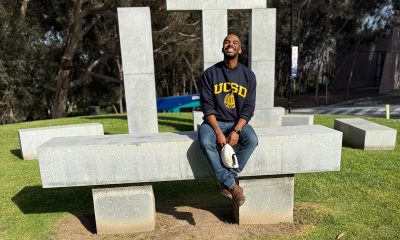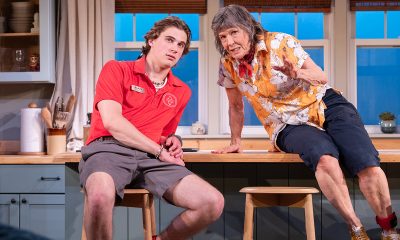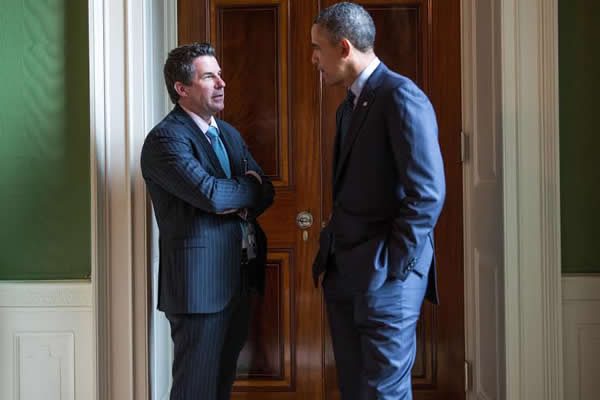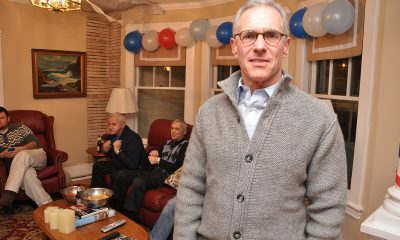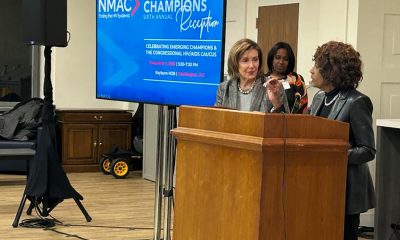Arts & Entertainment
Artistic adjustments
Signature’s ‘Russia’ premiere plays loosey goosey with the Rasputin legend
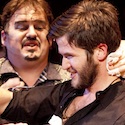
‘Brother Russia’
Through April 15
Signature Theatre
4200 Campbell Avenue, Arlington
703-573-SEAT
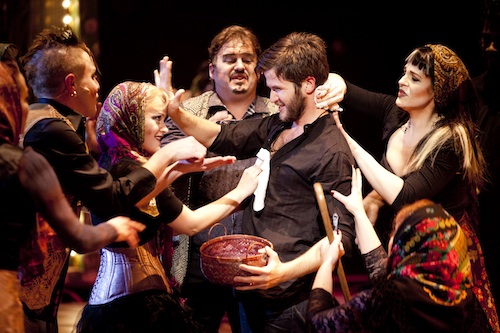
Doug Kreeger, center, as Grigori in Signature’s ‘Brother Russia.’ Also seen from left are Stephen Gregory Smith, Erin Driscoll, Russell Sunday and Rachel Zampelli. (Photo by Scott Suchman; courtesy Signature)
Advanced word on Signature Theatre’s world premiere production of “Brother Russia” promised the story of Rasputin set to music. If you’re expecting a faithful retelling of the mad monk’s rise from backwater Serbian peasant to Russian Imperial Court favorite, don’t. The show’s creators — musical team Dana Rowe (music) and John Dempsey (book and lyrics) — have toyed widely with the facts and invented something entirely new.
Propelled by a hard-driving rock score, “Brother Russia” is a play within a play. The action begins with a ragtag troupe of sometime post-Glasnost Russian actors gathering to perform their next show. The itinerant company’s leader, Brother Russia (John Lescault), suggests they tell his story, the story of Rasputin. Of course, he couldn’t possibly be the real Rasputin — though old, he’s not nearly old enough, and besides Rasputin’s murdered corpse was dragged from the Neva River in 1916. Still, the actors press on. Parts are assigned, costumes donned and places taken.
Visibly seated throughout the musical in a big wooden wheelchair, wisecracking Brother Russia watches things unfold from the sidelines. Family tragedy prompts young Rasputin (a bearded Doug Kreeger) to embark on his quixotic journey (lucidly staged by Signature’s gay artistic director Eric Schaeffer). Along the way a horny witch (Rachel Zampelli) claims his soul. Whether it’s her magic, or Rasputin’s later apprenticeship with a pair of faith-healing hucksters (Kevin McAllister and Christopher Mueller) that primes him for the big time is unclear. Once in St. Petersburg, Rasputin vaults to in-house healer to the young, hemophilic Tsarevich and wins inordinate influence with the boy’s parents, Tsar Nicholas and Tsarina Alexandra. Not surprisingly, court insiders grow jealous, particularly Prince Felix Yusupov (gay in real life, and here played by Stephen Gregory Smith as a totally louche, glam rock queen strutting in impossibly high red heels), and trouble ensues.
But what would a musical be without a love story? “Brother Russia” defies history by portraying Rasputin and the Tsar’s youngest daughter, the fabled Anastasia (played by the talented and always excellent Natascia Diaz), as a love match. Of course this never happened. Anastasia was a small child when womanizing Rasputin arrived at court. Ordinarily, reshuffling history isn’t a big deal, but with this shows it proves a recurring distraction.
Still, there are things to like. Kreeger, who is gay, is fully committed to the role. He’s terrific and his vocals are gorgeous whether sung sweetly (“The Tsarevich’s Lullaby”) or powerfully (“I Serve No Man”). Other highlights include Amy McWilliams’ turn as the opium smoking (more artistic license), fabulous headdress-wearing Tsarina; and Tracy Lynn Olivera’s number, a bawdily delivered drinking song titled “Vodka.”
Misha Kachman’s impressive set is an expansive stage of rough planks beneath strings of colored lights. In the background are tattered curtains, a depilated caravan and a battered steamer trunk. Costume designer Kathleen Geldard imagines the troupe as sexy and punk expect for Brother Russia who’s dressed as an aging hippie activist in an army surplus coat dotted with political buttons, Birkenstocks and a Che Guevara T-shirt.
In the end, Brother Russia is called out on his historical inaccuracies by the company’s irate manager (Russell Sunday). Ah ha, so this is where everything will make sense, right? Unfortunately, what feels like a tacked-on explanation is unsatisfying. Evidently, this is Brother Russia’s reality, and his proof of the eternal power of theater and the Russian spirit … or something.
Arts & Entertainment
Cynthia Erivo, Eva Victor, and ‘Blue Moon’ bring queer representation to Golden Globe film nominations
Nominees bring needed queer representation to awards race
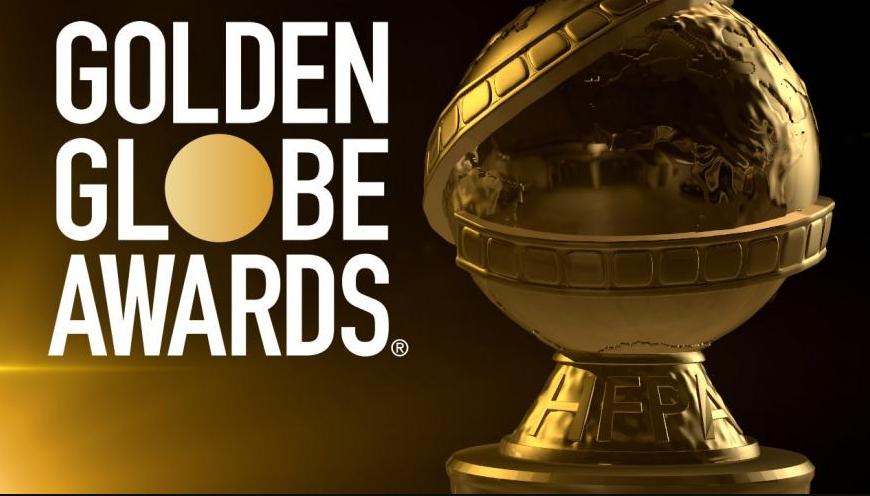
Cynthia Erivo, Eva Victor, and Miley Cyrus are among this year’s Golden Globes nominees, bringing queer representation into an awards race that needs it.
While Ethan Hawke was expected to get in for his lead performance as Lorenz Hart in “Blue Moon,” Richard Linklater’s film surprised by receiving a Best Picture Musical or Comedy nomination (Andrew Scott didn’t make the competitive supporting actor category.) Eva Victor for “Sorry, Baby” and Tessa Thompson for “Hedda” got in for Best Performance by a Female Actor in a Motion Picture Drama, while their films weren’t represented elsewhere. And in the Best Original Song category, Miley Cyrus was nominated for her “Avatar: Fire and Ash” end credit song “Dream As One.”
In notable omissions, “Wicked: For Good” missed a Best Picture Musical or Comedy nomination, signifying that the film will not repeat the same Oscar success of the first despite Erivo (who missed at the Critics Choice) and Ariana Grande getting in here. Erivo notably made history as the first Black actress to nab two lead actress nominations in the Musical or Comedy category. It’s also rare for two performers to get nominated in back-to-back years for playing the same character. The first film wasn’t eligible for original song awards since it exclusively featured Broadway music, but Stephen Schwartz was nominated for writing the sequel’s two new songs, “No Place Like Home” and “The Girl in the Bubble.” Another surprising omission for a Best Picture Musical or Comedy nomination was the JLo-led “Kiss of the Spider Woman,” featuring a central queer storyline.
The Golden Globe nominations are an official indicator that this year’s awards race doesn’t feature many openly queer actors or filmmakers, and Erivo, Thompson, and Victor are all competing in a competitive best actress category that includes the likes of Rose Byrne, Jessie Buckley, Emma Stone, Chase Infiniti, and Amanda Seyfried. That makes their inclusion in the ultimate Oscar line-up unlikely.
Some of these queer films have been more celebrated at the Independent Spirit Awards, where “Peter Hujar’s Day” led the film categories with five nominations, including for Ira Sachs as director and Ben Whishaw in lead performance. “Sorry, Baby” and “Lurker” each received four nominations, while “Twinless” received three nominations. Thompson was also recognized by the Indie Spirits, while Victor received a Best Original Screenplay nomination at the Critics Choice Awards for writing “Sorry, Baby.”
Over on the TV side, Emmy winner Hannah Einbinder was once again nominated for her supporting role for “Hacks,” and the show overall landed three nominations for its fourth season. “The Last of Us” star Bella Ramsey was nominated for Best Performance by a Female Actor in a Television Series Drama, although the show didn’t land any other nominations for its divisive second season. While most of these nominations carry over from the Emmys, “Pluribus” (which is still airing) found its way into the Best Television Series Drama category, indicating that it may be a serious threat for next year’s Emmy awards.
The full list of Golden Globe nominees is available here.
The 83rd Annual Golden Globes will stream live Sunday, Jan.11, 2026, at 5 p.m. PT / 8 p.m.ET on CBS and Paramount+.
Books
‘90s club kids will love Mark Ronson’s new book
‘Night People’ part esoteric hip-hop discography, part biography
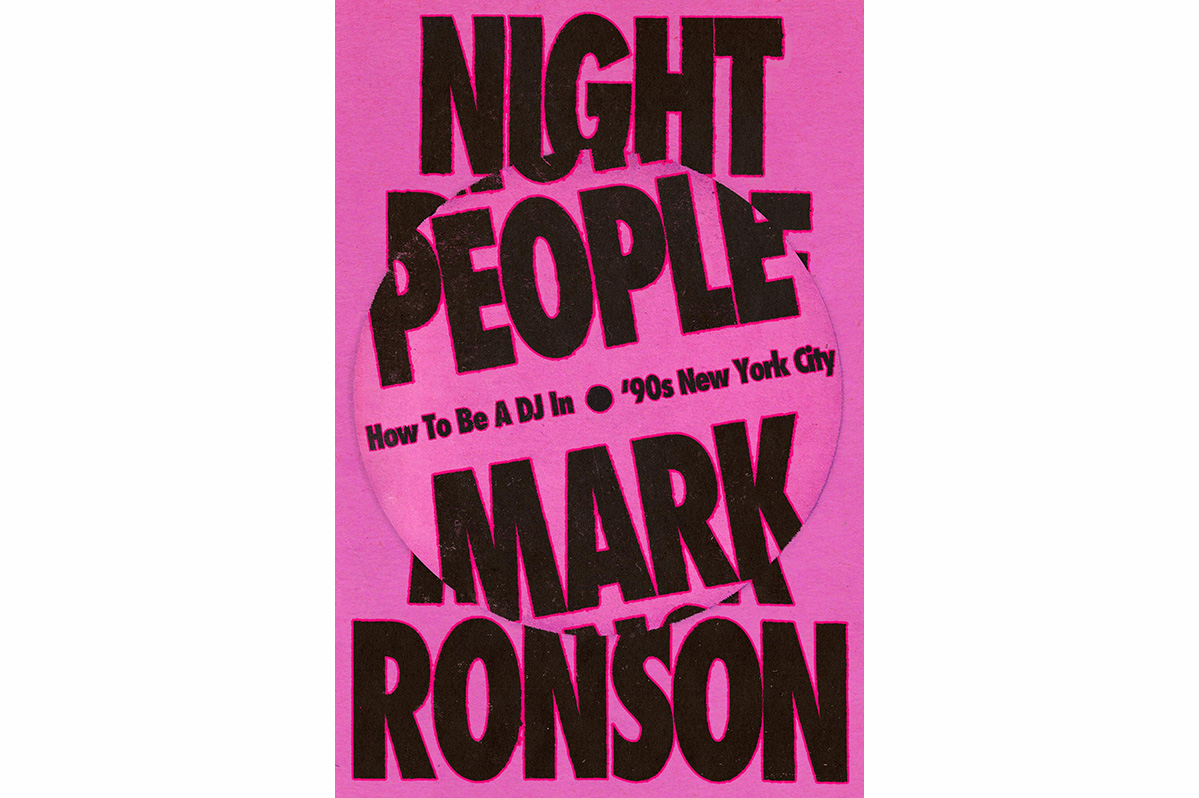
‘Night People’
By Mark Ronson
c.2025, Grand Central
$29/256 pages
You just can’t hold still.
The music starts and your hips shake, your shoulders bounce, your fingers tickle the sky to match a beat. Your air guitar is on-point, your head bops and your toes tap. You can’t help it. As in the new memoir, “Night People” by Mark Ronson, you just gotta dance.

With a mother who swanned around with rock bands, a father who founded a music publishing company, and a stepfather who founded the band, Foreigner, it was natural that Mark Ronson would fall into a music career of some sort. He says he was only 10 years old when he realized the awesome power of music.
As a pre-teen, he liked to mix music in his stepfather’s studio. As a teenager, he formed a band with Sean Lennon that didn’t quite catch on. In the fall of his senior year of high school, Ronson began sneaking into Manhattan clubs to listen to music, dance, and find drugs. It was there that he noticed the alchemy that the DJs created and he searched for someone who’d teach him how to do that, too. He became obsessed.
Finding a gig in a New York club, though, was not easy.
Ronson worked a few semi-regular nights around New York City, and at various private parties to hone his skills. His mother purchased for him the electronic equipment he needed, turntables, and amps. He befriended guys who taught him where to get music demos and what to look for at distributor offices, and he glad-handed other DJs, club owners, and music artists.
That, and the rush he got when the dance floor was packed, made the job glamorous. But sometimes, attendance was low, DJ booths were located in undesirable places, and that totally killed the vibe.
Some people, he says, are mostly day people. For others, though, sunlight is something to be endured. Nighttime is when they when they feel most alive.
Part esoteric hip-hop discography, part biography, part SNL’s Stefan, and part cultural history, “Night People” likely has a narrow audience. If you weren’t deep into clubbing back in the day, you can just stop here. If you were ages 15 to 30, 30 years ago, and you never missed club night then, keep reading. This is your book.
Author Mark Ronson talks the talk, which can be good for anyone who knows the highs of a jam-packed club and the thrill of being recognized for skills with a turntable. That can be fun, but it may also be too detailed: mixology is an extremely heavy subject here. Many of the tunes he names were hits only in the clubs and only briefly, and many of the people he name-drops are long gone. Readers may find themselves not particularly caring. Heavy sigh.
This isn’t a bad book, but it’s absolutely not for everyone. If you weren’t into clubbing, pass and you won’t miss a thing. If you were a die-hard club kid back then, though, “Night People” will make your eyes dance.
Want more? Then check out “What Doesn’t Kill Me Makes Me Weirder and Harder to Relate To” by Mary Lucia (University of Minnesota Press). It’s Lucia’s tale of being a rock DJ in Minneapolis-St. Paul, life with legions of listeners, and not being listened to by authorities for over three harrowing, terrifying years while she was stalked by a deranged fan.
The Blade may receive commissions from qualifying purchases made via this post.

Some gifts scream practical, others whisper luxury, and a few flat-out blur the lines. From cocoa that feels ceremonial to a cologne that linger like a suggestive smirk, this year’s ultimate gift picks prove that thoughtful (and occasionally naughty) presents don’t have to be prosaic. Welcome to your holiday cheat sheet for festive tangibles that get noticed, remembered, and maybe even result in a peck of gratitude planted under the mistletoe. Consensually, of course.
Amber Glass Champagne Flutes
Pop the champs – but make it vintage. These tulip-shaped stunners in amber-tinted glass bring all the Gatsby vibes without the Jazz-age drama. Whether you’re toasting a milestone or celebrating a Tuesday, their seven-ounce capacities and hand-wash-only care make ‘em as practical as they are pretty. Pair with a thoughtful bottle of bubs and gift with a glittering wink. $18, NantucketLooms.com
Disaster Playbook by Here Comes the Apocalypse
Because the end of the world shouldn’t be a solo act, this spiral-bound guide is your step-by-step roadmap to surviving and thriving when everything else goes sideways, which might be sooner than you think. Packed with checklists, drills, and a healthy dose of humor, it’s like a survival manual written by your most prepared (and slightly snarky) friend. Whether you’re prepping for a zombie apocalypse or, more realistically, REVOLUTION!, this playbook’s got your back. $40, HereComesTheApocalypse.com
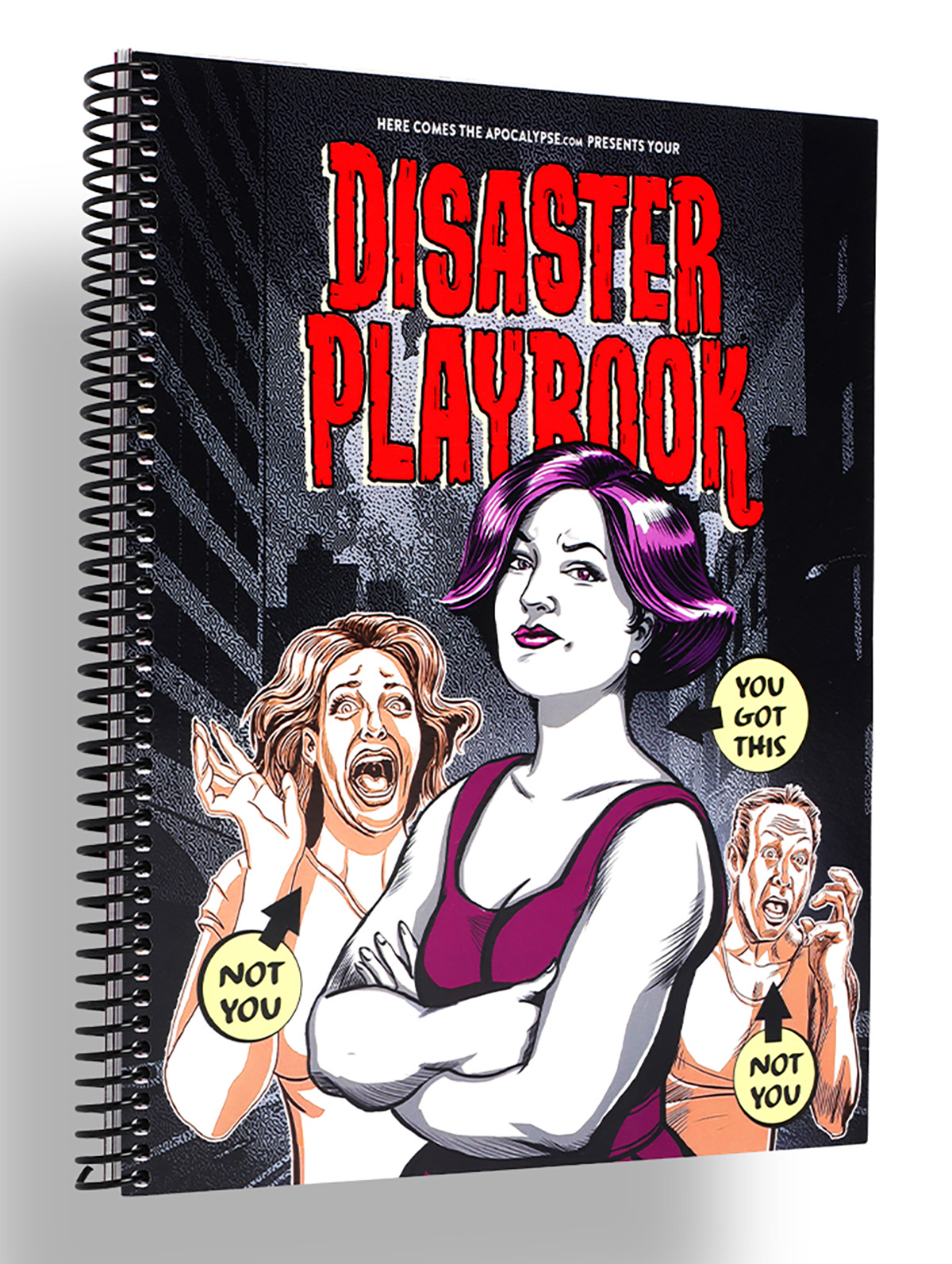
Wickless Vulva Candles
Bold, luxurious, and completely flame-free, CTOAN’s wickless candles melt from beneath on a warmer, releasing subtle, sophisticated fragrances, like sandalwood or lavender. The vulva-shaped wax adds a playful, provocative element to any space –perfect for a bedroom, living room, or anywhere you want elegance with an edge. A gift that celebrates form, intimacy and self-expression, no fire required. $39, CTOANCO.com
Villeroy & Boch Royal Classic Christmas Collection
Every meal is a mini celebration – with whimsy at every place setting – in Villeroy & Boch’s Royal Classic festive dinnerware collection that hits all the right notes. Made from premium German porcelain, it features nostalgic little toys, nutcrackers, and rocking horses in delicate relief, giving your holiday spread a playful but refined twist. Dishwasher- and microwave-safe, it’s luxe without the fuss. Gift a piece to a special someone, or start a collection they’ll use (and show off) for years to come. $22-$363, Villeroy-Boch.com
Greenworks Electric Lawnmower
You a ’hood queen who considers lawn care performance art – or just wants to rule the cul-de-sac in quiet, emission-free glory? Greenworks’ zero-turn electric mower has the muscle of a 24-horsepower gas engine but none of the fumes, drama or maintenance. Six 60V batteries and a 42-inch deck mean you can mow up to two-and-a-half acres on a single charge – then plug in, recharge, and ride again. It’s whisper-quiet, slope-ready, and smooth enough to make you wonder why you ever pushed anything besides your queer agenda. The perfect gift for the homeowner who loves sustainability, symmetry, and showing off their freshly striped yard like that fresh fade you get on Fridays. $5,000, GreenworksTools.com
Molekule Air Purifier
For the friend who treats their space like a sanctuary (or just can’t stand sneezes), the Molekule Air Pro is magic in motion. Covering up to 1,000 square feet, it doesn’t just capture allergens, VOCs, and smoke – it destroys them, leaving your air feeling luxury-clean. FDA-cleared as a Class II medical device, it’s serious science disguised as modern design. Gift it to your city-dwelling, pet-loving, candle-burning friend who likes their living room as pristine as their Instagram feed. $1,015, Molekule.com

Cipriani Prosecco Gift Set
Effervescent with stone-fruit sweetness and a touch of Italian flair, the Cipriani Bellini & Prosecco gift set brings brunch-level glamour to any day of the week. The Bellini blends rich white-peach purée with sparkling wine, while the dry ’secco keeps things crisp and celebratory. Pop a bottle, pour a flute, and suddenly winter weeknights feel like a party – even with your pants off. $36, TotalWine.com
Woo(e)d Cologne
British GQ recently crowned Woo(e)d by ALTAIA the “Best Date Night Fragrance,” and honestly, they nailed it. Confident without being cocky – smoky gaïac and Atlas cedarwood grounds the room while supple leather and spicy cardamom do all the flirting – it’s a scent that lingers like good conversation and soft candlelight. Gift it to the one who always turns heads – or keep it for yourself and let them come to (and then on) you. $255, BeautyHabit.com

Lococo Cocoa Kit
Keep the run-of-the-mill mugs in the cabinet this Christmas and pull out Lococo’s handcrafted Oaxacan versions that demand you slow down and sip like it matters. Paired with a wooden scoop, rechargeable frother, and Lococo’s signature spice hot-chocolate blend (vegan, gluten-free, with adaptogenic mushrooms), this holiday kit turns Mexi-cocoa into a mini ritual you’ll look forward to. Perfect for anyone who loves a little indulgence with a side of ¡A huevo! energy.
Manta Sleep Mask
Total blackout, zero pressure on the eyes, and Bluetooth speakers built right into the straps, this ain’t your mama’s sleep mask — but it could be. The Manta SOUND sleep mask features C-shaped eye cups that block every hint of light while ultra-thin speakers deliver your favorite white noise, meditation, or late-night playlist straight to your ears. With 24-hour battery life, breathable fabric, and easy-to-adjust sound, it turns any bed (or airplane seat) into a five-star sleep suite. Perfect for anyone who treats shut-eye like an art form (or just wants to escape their roommate’s late-night bingin’ and/or bangin’). $159, MantaSleep.com

Shacklelock Necklace
Turn the industrial-chic vibe of a shackle into a sleek statement. Mi Tesoro’s platinum-plated stainless-steel necklace sits on an 18-inch wheat chain, featuring a shackle-style latch pendant that’s waterproof, tarnish-free, and totally fuss-les. Beyond style, it nods to a classic gesture in the queer leather community: replacing a traditional Master lock with something elegant to quietly signal belonging to someone special. Wear it solo for a minimalist edge or layer it like you mean it; either way this piece locks in both your look and your intentions. $90, MiTesoroJewelry.com
Parkside Flask Mojave Edition
Wine nights get a desert glow-up with Parkside’s limited-edition 750-milliliter all-in-one flask draped in sun-washed bronze and badland hues like sage, sand, and terracotta – with magnetic stemless tumblers that snap on for effortless shareability. It keeps your vino chilled for 24 hours, pours without drips (no tears for spilled rosé, please), and even lets you laser-engrave your own mantra or inside joke. Perfect for picnics, surprise rooftop clinks, or gifting to your favorite wine (or desert) rat. $149, HighCampFlasks.com

Mikey Rox is an award-winning journalist and LGBT lifestyle expert whose work has published in more than 100 outlets across the world. Connect with him on Instagram @mikeyroxtravels.
-

 a&e features5 days ago
a&e features5 days agoMeet Mr. Christmas
-

 Puerto Rico5 days ago
Puerto Rico5 days agoPuerto Rico’s largest LGBTQ organization struggling amid federal funding cuts
-

 Opinions4 days ago
Opinions4 days agoVictory Fund continues to shun me and my place in LGBTQ history
-

 National5 days ago
National5 days agoLawmakers warn of HIV crisis as federal support collapses



